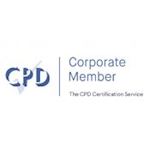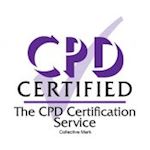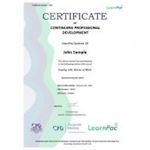Coping with Stress at Work - Level 2 - Online Course - CPD Accredited
CPDUK Accredited | Instant Course Access | Includes Assessment & Certificate | Instant Certificate Download
LearnPac Systems
Summary
- Certificate of completion - Free
- Exam(s) / assessment(s) is included in price
- Tutor is available to students
Add to basket or enquire
Overview
Coping with Stress at Work - Level 2 - Online Course - CPD Accredited.
Welcome to our online Coping with Stress at Work for all sectors. This online course was developed in line with the latest UK legislation and meet the recommendations set out by the National Health Service (NHS), Care Quality Commission (CQC), the Health and Safety Executive and other professional and regulatory bodies.
Certificate duration: 2 years
Entry requirements: No entry restrictions
Recommended prerequisites: N/A
Assessment type: End of course assessment
Assessment pass mark – 80% needed to pass and gain a CPD certificate
Cost(s) of assessment and certification – All costs included in the course price
Awarding/Accrediting body – CPD Certification Service (CPDUK)
Coping with Stress at Work - Level 2 - Online Course - CPD Accredited.
CPD
Course media
Description
Course aims
The aims and objectives of this online Coping with Stress at Work training course are to improve awareness of how to deal with stressful situations at work and other settings.
Learning outcomes
On completion of this online Coping with Stress at Work training course, the learner will:
- Know what is meant by ‘stressful incident’ at work,
- Understand why it is essential to seek help after a stressful incident,
- Understand how people react to stressful incidents,
- Have an awareness of the potential impact of repeated stressful events/occurrences,
- Be aware of the common thoughts and feelings that may be experienced following a stressful event,
- Be mindful of the effects of these reactions on work, friends and family,
- Understand the different ways of coping with stressful events,
- Know what to do and what not to do following a stressful event,
- Know when to seek professional help following a stressful event, and
- Know where to find help and support following a stressful incident.
What is stress?
Stress is primarily a physical response. When stressed, the body thinks it is under attack and switches to ‘fight or flight’ mode, releasing a complex mix of hormones and chemicals such as adrenaline, cortisol and norepinephrine to prepare the body for physical action. This causes several reactions, from blood being diverted to muscles to shutting down unnecessary bodily functions such as digestion.
Through the release of hormones such as adrenaline, cortisol and norepinephrine, the caveman gained a rush of energy, which prepared him to either fight the tiger or run away. That heart-pounding, fast breathing sensation is the adrenaline; as well as a boost of energy; it enables us to focus our attention so we can quickly respond to the situation.
In the modern world, the ‘fight or flight’ mode can still help us survive dangerous situations, such as reacting swiftly to a person running in front of our car by slamming on the brakes.
Why is this online Coping with Stress in the Workplace training course important?
While some workplace stress is normal, excessive stress can interfere with your productivity and performance, impact your physical and emotional health, and affect your relationships and home life. It can even mean the difference between success and failure in the job. You can’t control everything in your work environment, but that doesn’t mean you’re powerless—even when you’re stuck in a difficult situation.
Whatever your ambitions or work demands, there are steps you can take to protect yourself from the damaging effects of stress, improve your job satisfaction, and bolster your well-being in and out of the workplace.
What is covered in this course?
This Coping with Stress at Work e-learning course covers the following:
- Definition of ‘stressful incident’ at work,
- Why it is essential to seek help after a stressful incident?
- How do people react to stressful incidents?
- What is the impact of repeated stressful events/incidents?
- The common thoughts and feelings that may be experienced following a stressful event,
- The effects of these reactions on work, friends and family,
- Exploring the different ways of coping with stressful events,
- What to do and what not to do following a stressful event,
- When to seek professional help following a stressful event, and
- Where to seek advice and support following a stressful incident.
Coping with Stress at Work - Level 2 - Online Course - CPD Accredited.
Who is this course for?
This Coping with Stress at Work e-learning course should be completed by those who work in all sectors, including all client-facing roles such as:
- Security services
- Paramedics
- Transport services (e.g., train, taxi and bus drivers)
- Those who work in retail organisations
- Those who work in hospitality and catering services
- NHS medical, nursing, AHP and care staff
- Locum doctors and nurses
- Locum allied health professionals (AHPs)
- Agency nurses
- Agency workers
- Healthcare Assistants
- Support workers
- Care assistants
- Nursery staff
- Teachers and teaching staff
- Volunteers, and
- Community services.
Coping with Stress at Work - Level 2 - Online Course - CPD Accredited.
Requirements
Learn anywhere, anytime on any device.
You will need access to a desktop computer, laptop, tablet or smartphone device to complete these online courses. You can start, pause/stop and return to where you left off.
Our courses utilise responsive design features, making them available on any device of your choice.
Coping with Stress at Work - Level 2 - Online Course - CPD Accredited.
Career path
Our online courses and programmes range from introductory modules at Level 1 (awareness/beginner) to advanced and expert modules up to Level 6.
Our e-learning modules count towards CPD hours for professionals in various sectors as well as meeting mandatory and statutory requirements (where relevant).
Coping with Stress at Work - Level 2 - Online Course - CPD Accredited.
Questions and answers
Currently there are no Q&As for this course. Be the first to ask a question.
Certificates
Certificate of completion
Digital certificate - Included
Reviews
Currently there are no reviews for this course. Be the first to leave a review.
Legal information
This course is advertised on reed.co.uk by the Course Provider, whose terms and conditions apply. Purchases are made directly from the Course Provider, and as such, content and materials are supplied by the Course Provider directly. Reed is acting as agent and not reseller in relation to this course. Reed's only responsibility is to facilitate your payment for the course. It is your responsibility to review and agree to the Course Provider's terms and conditions and satisfy yourself as to the suitability of the course you intend to purchase. Reed will not have any responsibility for the content of the course and/or associated materials.





